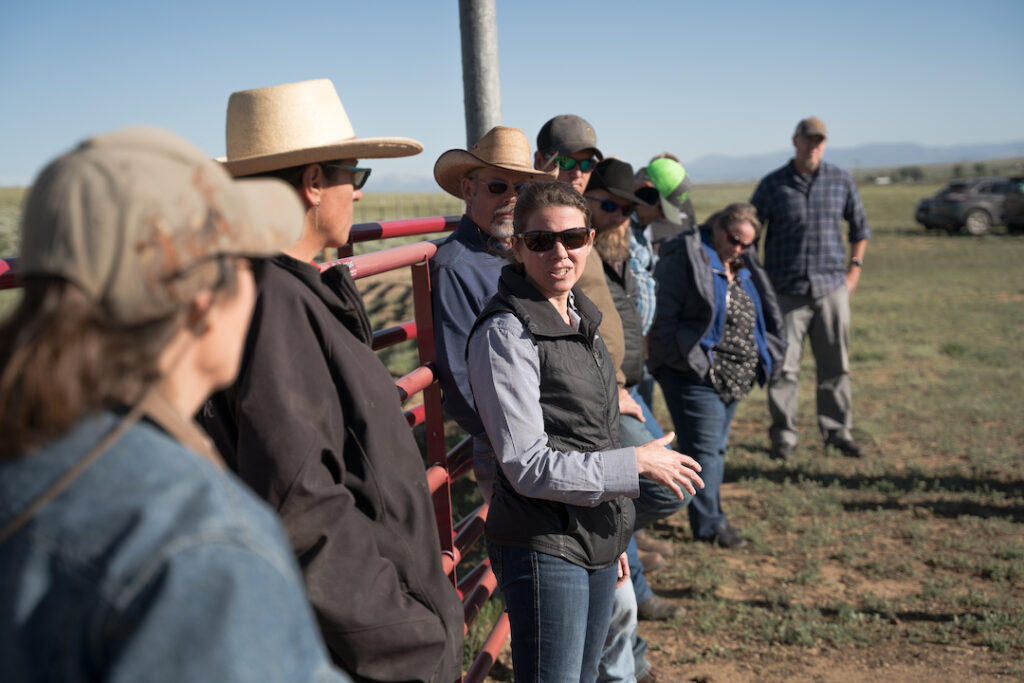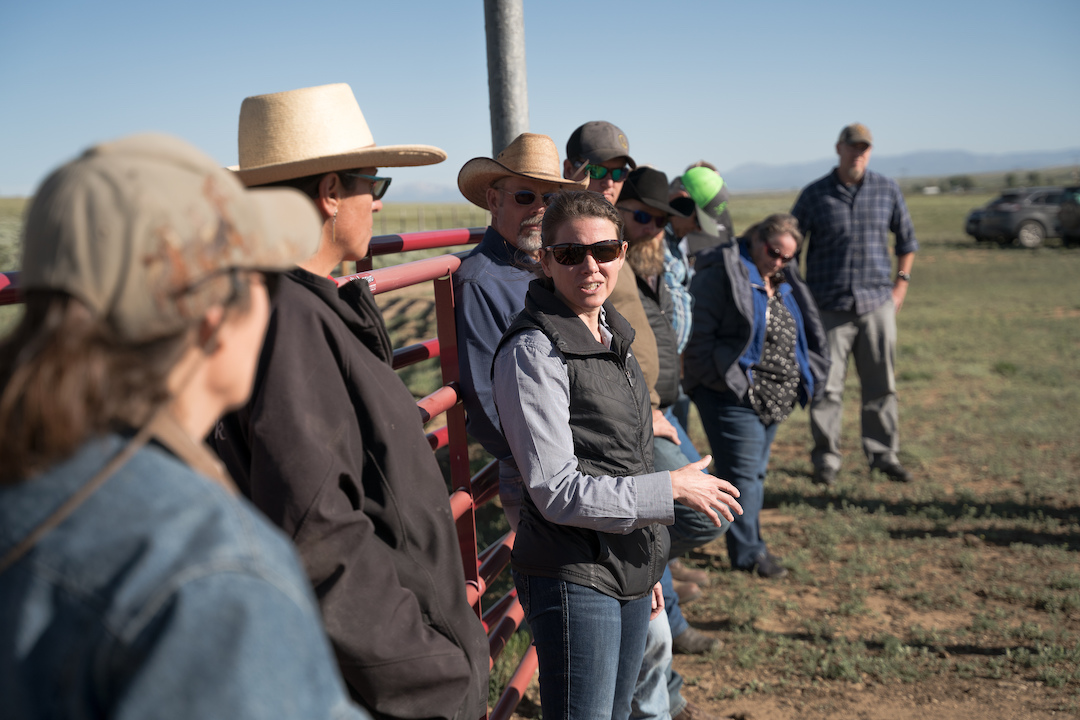North Park meeting brings ranchers together to talk solutions, challenges, as wolves bear down

Walden, CO — Wolves have arrived in Colorado ahead of schedule and are now under federal management, and ranchers in Colorado are concerned about what that means for their businesses. Yesterday at the Wattenburg Center at the Jackson County fairgrounds here in Walden, more than 40 ranchers from Northern Colorado showed up to hear from a Wyoming producer with years of experience ranching alongside wolves and talk with the agency wildlife managers responsible for wolves in Colorado. The North Park Stockgrowers Association and Western Landowners Alliance organized the event.
At the event, Western Landowners Alliance distributed “Supporting working lands and wildlife with the 4 C’s: Policy lessons from the Conflict Reduction Consortium.” The memo, produced by the Conflict Reduction Consortium (CRC), a network of ranchers, conservation organizations, state and federal wildlife management agencies and research scientists convened by the Western Landowners Alliance (WLA), calls on policy makers to take action to support thriving rural communities and their working lands and wildlife populations in the American West.
“In Colorado we’re just being squeezed between development pressure and wildlife,” said Walden-area rancher Mike Morgan. “We really need help to cope with these challenges, if we’re going to protect the open space that makes Colorado so amazing and continue producing the food and fiber everyone needs.”
Thanks to successful recovery efforts, wolves and other large wildlife again occupy large portions of the West. Much of the habitat for these iconic species is on privately-managed land, held by people that pay the bills from raising livestock.
Wildlife, meanwhile, is also an important economic driver in Colorado, and yet in many places the working lands that sustain wildlife see the least economic benefit and often experience the greatest impact. The memo specifically requests rules and funding that support a future where people, livestock, and wildlife all thrive. Simple changes can help state and federal policy work in concert to mitigate conflicts between wildlife and livestock and increase economic solutions that support resilient, biodiverse working lands.
“The 4C’s, compensation, conflict prevention, control (lethal) and collaboration, comprise a systems-based conflict reduction framework that supports conservation and the viability of working lands in the west,” said Alex Few, the Working Wild Challenge Coordinator who convenes the CRC. “The policy recommendations within this framework create conditions that allow the social and financial burden associated with wildlife conflicts to be balanced.”
Sublette County, Wyoming, sheep and cattle rancher Cat Urbigkit, who has had wolves on and around her ranch for decades, presented at the meeting. “Colorado Livestock Producers are now carrying the burden for America’s interest in wolves,” Urbigkit said. She uses livestock guardian dogs, flashing lights, and “dozens” of other deterrence methods. “While all non-lethals will fail at some point, they will work to minimize the damage, and increase herd health. I think that you need all 4 C’s if you are going to have conflict reduction.”
In Colorado, where the wolf population is set to grow through reintroduction and natural colonization from neighboring states, like it has around Walden where depredations are already taking place, solutions that work for both working lands and wildlife are evidently necessary. The gathering here yesterday shows that livestock producers, at least in Walden, are eager to learn more about what’s out there and they want their fellow Coloradans to understand what they are up against.
“When talking about wolves, we need to educate people, talk to them, take them out for a drive. Get involved with wolf advocates and the urban public,” Adam VanValkenburg, President of North Park Stockgrowers, told the crowd. “There are going to be conversations that are challenging, but at the end of the day we need to get people to see and understand our side of the story.”
2 Comments
Join WLA to stay up to date on the most important news and policy for land stewards.
Become a member for free today and we will send you the news and policy developments critical to the economic and ecological health of working lands.
WLA works on behalf of landowners and practitioners throughout the West. We will never share your contact information with anyone.

With Wolves , Grizzly Bears, and people all using the same land that ranchers are raising cattle on dose cause hardship. and a lot of extra work. We can use some methods such as flag fencing, fox lights, guardian dogs that are affective short term, but in the end as long as there is wolves and livestock using the same land there will be dead cattle , and dead wolves. we can however keep this to a minimum through proper stock management. With almost 40 years of tending cattle summer and winter along with Wolves ,and Grizzly bears in British Columbia , and SW Alberta Canada i have had to learn how to manage livestock in a way that allows me to utilize summer , and winter grazing range having to a large number of wolf and bears kills , and not having to hunt , shoot ,and trap a bunch of wolves ,or bears.
While all of the mentioned deterrents have some effectiveness, none are as effective as the proponents would have you believe. Until we teach our domestic livestock to be herding animals–as nature intended– AND we understanding that man also has always been a predator and allow the removal of wolves and bear that are killing and stalking, the problems will only get worse. It’s not impossible but not easy. We all, regulators included, must see both sides of every story.